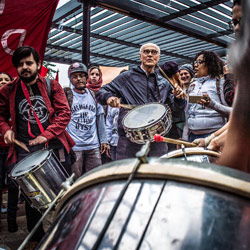http://blogs.wvgazettemail.com/coaltattoo/2017/04/27/miners-get-another-week-then-what/
Lawmakers and UMWA members held another press conference at the Capitol in Washington on Wednesday.
Word came out last night that the latest government funding bill does contain language to preserve health-care benefits for more than 22,000 retired United Mine Workers of American members and families … but this new "continuing resolution" would only protect those benefits for another week, through May 5, the term of the government funding resolution itself.
The press release from House Appropriations Chairman Rodney Frelinghuysen , R-N.J., said:
This Continuing Resolution will continue to keep the government open and operating as normal for the next several days, in order to finalize legislation to fund the federal government for the rest of the fiscal year. I am optimistic that a final funding package will be completed soon. It is time that this essential work is completed so that critical programs and activities – including national defense – are properly and adequately funded for the year.
Regarding the UMWA issue, the release added:
The legislation also extends the December CR provision for health care benefits for retired coal miners and their dependents for the length of this CR. This provision protects coal miners and their families from losing health care benefits.
For the UMWA's retirees, and especially for those who understand the importance of the troubled pension plan that involves far more people — something like 89,000 current pensioners and another 29,000 who have vested in the program — this week-long extension is certainly a mixed blessing, and a potential source of more trouble. The concern for the union and its retirees at this point is that the additional time before a longer-term funding bill is approved gives some within the coal industry still more time to try to carve out some language for themselves. That's because, as mentioned in a recent Pittsburgh Post-Gazette article, some Republican lawmakers have an alternative plan:
The emerging GOP proposal, spearheaded by U.S. Rep. Tim Murphy of Upper St. Clair, would divert that money to provide health care benefits for retirees from profitable coal companies that already are providing that coverage.
Rep. Murphy hasn't yet dropped his proposal as an actual legislative proposal yet, and it hasn't gotten a lot of media attention. But it was being promoted in some radio ads on stations in Northern West Virginia and Western Pennsylvania over the last few weeks. The ads were funded by a group called the Secure Energy for America Association, which has close ties to CONSOL Energy — a company that has been trying to rid itself of the rest of its coal operations to focus on natural gas.
The UMWA's concern is that, first, this proposal would relieve companies like CONSOL of their obligations to fund health-care benefits under the Coal Act and, second, it would do so by diverting the money that the union's Miner Protection Act would use to stabilize the UMWA pension plan.
Phil Smith, the union's spokesman, said this morning that the union is pleased to have its health-care benefits language in the short-term government funding bill, but remains concerned about where the broader issue could be headed, given the language that Rep. Murphy and some in the industry are pushing:
If it's going to give Congress more time to come to a permanent solution for these benefits and pensions then that's what it's going to take. But we're concerned that a segment of the coal industry appears to be trying to take away the most logical source of funding for pensions going forward just so they can pad their bottom line.
-- via my feedly newsfeed





